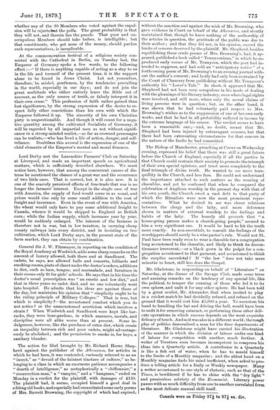The action for libel brought by Mr. Richard Horne Shep-
herd against the publisher of the Athenceum, for articles in which he had been, it was contended, variously referred to as an "insect," as "devoid of the faintest tincture of culture," as be- longing to a class in which an enormous patience accompanies a " dearth of intelligence," as metaphorically a " chiffonnier," a " resurrection-man," a " vampire," and a " hangman," ended on Monday in a verdict for the plaintiff, with damages of £150. The plaintiff had, it seems, occupied himself a good deal in editing old books, and especially had resuscitated some early poems of Mrs. Barrett Browning, the copyright of which had expired, without the sanction and against the wish of Mr. Browning, who gave evidence in Court on behalf of the Athenceuni, and stoutly maintained that, though he knew nothing of the authorship of the articles in question, the gratitude of the public was due to their author ; and that they did not, in his opinion, exceed the limits of censure deserved by the plaintiff. Mr. Shepherd, besides republishing these crude poems of Mrs. Browning's, had, it ap- peared, published a book called " Tennysoniana," in which he re- produced early verses of Mr. Tennyson, which the poet had in- tended to suppress, and had sold an " anticipatory notice " of a forthcoming poem of Mr. Browning's to an evening journal with- out the author's consent ; and lastly had only been restrained by the Court of Chancery from publishing without Mr. Tennyson's authority his " Lover's Tale." In short, it appeared that Mr. Shepherd had not been very scrupulous in his mode of dealing with the gleanings of his literary industry, even where legal rights were involved, and still more, where only the moral claims of living persons were in question ; but, on the other hand, it was shown that he had voluntarily paid respect to Mrs. Browning's wishes as to the suppression of one of her own early works, and that he had in all probability suffered in income by the extreme language of his censor. The verdict seems to have been a reasonable one ;—and, no doubt, meant that Mr. Shepherd had been injured by extravagant censure, but that there had been extenuating circumstances for that censure in the nature of the faults he had committed.


































 Previous page
Previous page